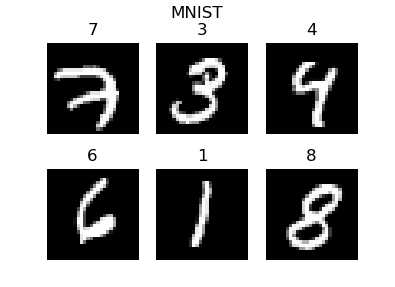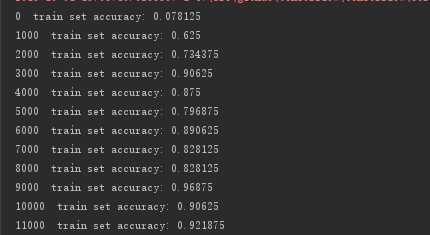TensorFlow 训练 MNIST —— softmax 单层神经网络
Posted laishenghao
tags:
篇首语:本文由小常识网(cha138.com)小编为大家整理,主要介绍了TensorFlow 训练 MNIST —— softmax 单层神经网络相关的知识,希望对你有一定的参考价值。
1、MNIST数据集简介
首先通过下面两行代码获取到TensorFlow内置的MNIST数据集:
from tensorflow.examples.tutorials.mnist import input_data mnist = input_data.read_data_sets(‘./data/mnist‘, one_hot=True)
MNIST数据集共有55000(mnist.train.num_examples)张用于训练的数据,对应的有55000个标签;共有10000(mnist.test.num_examples)张用于测试的图片的数据,同样的有10000个标签与之对应。为了方便访问,这些图片或标签的数据都是被格式化了的。
MNIST数据集的训练数据集(mnist.train.images)是一个 55000 * 784 的矩阵,矩阵的每一行代表一张图片(28 * 28 * 1)的数据,图片的数据范围是 [0, 1],代表像素点灰度归一化后的值。
训练集的标签(mnist.train.labels)是一个55000 * 10 的矩阵,每一行的10个数字分别代表对应的图片属于数字0到9的概率,范围是0或1。一个标签行只有一个是1,表示该图片的正确数字是对应的下标值, 其余是0。
测试集与训练集的类似,只是数据量不同。
以下代码显示部分MNIST训练图片的形状及标签:
import numpy as np import matplotlib.pyplot as plot from tensorflow.examples.tutorials.mnist import input_data mnist = input_data.read_data_sets(‘./data/mnist‘, one_hot=True) trainImages = mnist.train.images trainLabels = mnist.train.labels plot.figure(1, figsize=(4, 3)) for i in range(6): curImage = np.reshape(trainImages[i, :], (28, 28)) curLabel = np.argmax(trainLabels[i, :]) ax = plot.subplot(int(str(23) + str(i+1))) plot.imshow(curImage, cmap=plot.get_cmap(‘gray‘)) plot.axis(‘off‘) ax.set_title(curLabel) plot.suptitle(‘MNIST‘) plot.show()
上述代码输出的MNIST图片及其标签:

2、通过单层神经网络进行训练
1 def train(trainCycle=50000, debug=False): 2 inputSize = 784 3 outputSize = 10 4 batchSize = 64 5 inputs = tf.placeholder(tf.float32, shape=[None, inputSize]) 6 7 # x * w = [64, 784] * [784, 10] 8 weights = tf.Variable(tf.random_normal([784, 10], 0, 0.1)) 9 bias = tf.Variable(tf.random_normal([outputSize], 0, 0.1)) 10 outputs = tf.add(tf.matmul(inputs, weights), bias) 11 outputs = tf.nn.softmax(outputs) 12 13 labels = tf.placeholder(tf.float32, shape=[None, outputSize]) 14 15 loss = tf.reduce_mean(tf.square(outputs - labels)) 16 optimizer = tf.train.GradientDescentOptimizer(0.1) 17 trainer = optimizer.minimize(loss) 18 19 sess = tf.Session() 20 sess.run(tf.global_variables_initializer()) 21 for i in range(trainCycle): 22 batch = mnist.train.next_batch(batchSize) 23 sess.run([trainer, loss], feed_dict={inputs: batch[0], labels: batch[1]}) 24 25 if debug and i % 1000 == 0: 26 corrected = tf.equal(tf.argmax(labels, 1), tf.argmax(outputs, 1)) 27 accuracy = tf.reduce_mean(tf.cast(corrected, tf.float32)) 28 accuracyValue = sess.run(accuracy, feed_dict={inputs: batch[0], labels: batch[1]}) 29 print(i, ‘ train set accuracy:‘, accuracyValue) 30 31 # 测试 32 corrected = tf.equal(tf.argmax(labels, 1), tf.argmax(outputs, 1)) 33 accuracy = tf.reduce_mean(tf.cast(corrected, tf.float32)) 34 accuracyValue = sess.run(accuracy, feed_dict={inputs: mnist.test.images, labels: mnist.test.labels}) 35 print("accuracy on test set:", accuracyValue) 36 37 sess.close()
3、训练结果
上述模型的最终输出为:

由打印日志可以看出,前期收敛速度很快,后期开始波动。最后该模型在训练集上的正确率大概为90%,测试集上也差不多。精度还是比较低的,说明单层的神经网络在处理图片数据上存在着很大的缺陷,并不是一个很好的选择。

本文地址:https://www.cnblogs.com/laishenghao/p/9576806.html
以上是关于TensorFlow 训练 MNIST —— softmax 单层神经网络的主要内容,如果未能解决你的问题,请参考以下文章
Tensorflow的官方MNIST模型具有较高的训练精度,但预测性能较低
Tensorflow:如果我有一个训练有素的 MNIST 模型,我如何检测图像中的手写数字?
TensorFlow2 手把手教你训练 MNIST 数据集 part 2